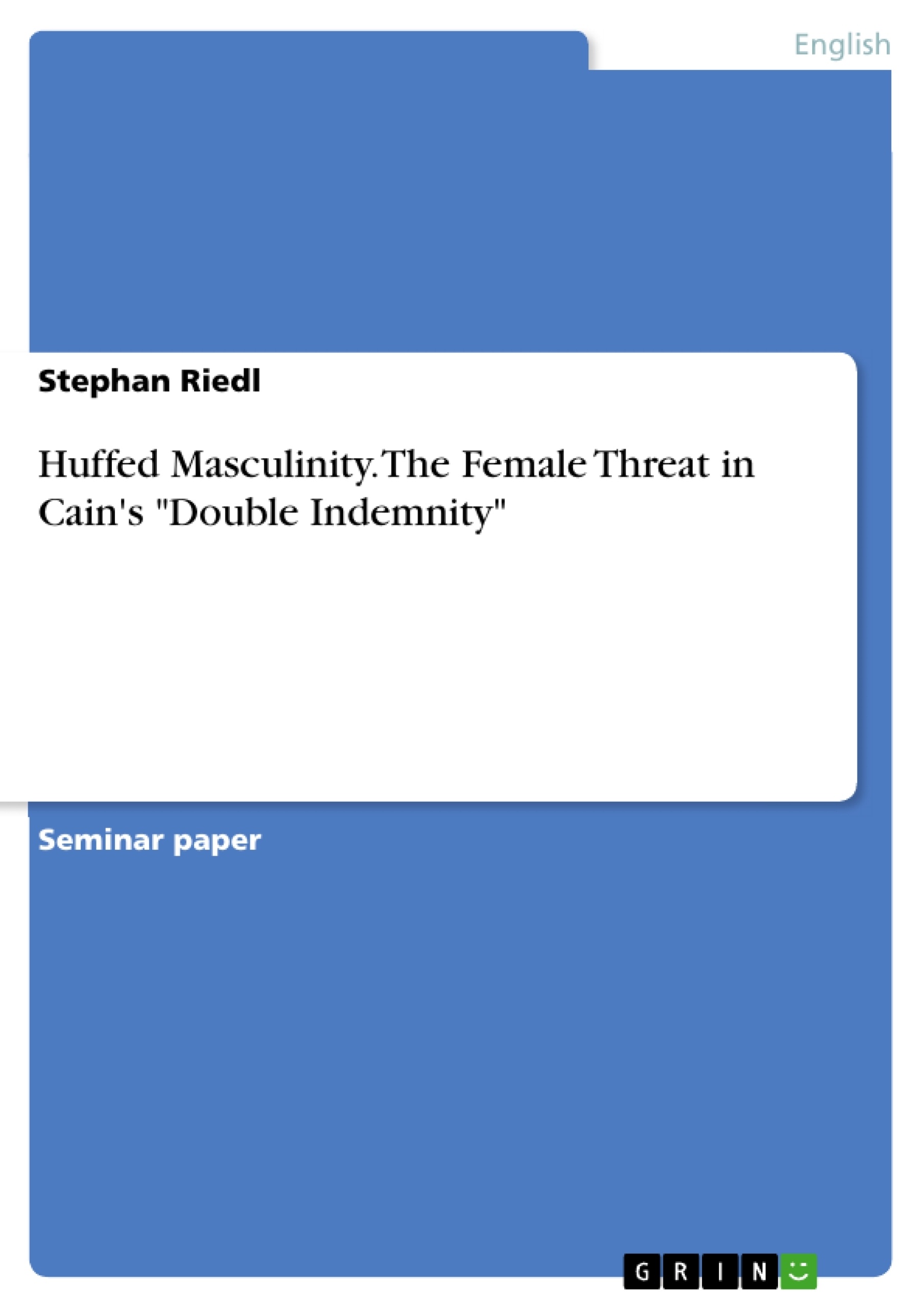"Double Indemnity" was first published in 1935 and affirmed James M. Cain’s status as a novelist. By reading it, one can learn why, but that is not the only observation that can be made. It is noticeable that Phyllis, the Femme Fatale of the story, constantly oversteps the boundaries of her gender, thus posing a threat to men. The question that started this Term Paper was: How much of a threat to patriarchal masculinity is Phyllis and is this threat contained? The thesis is that Phyllis subverts patriarchal masculinity in two spheres, the business sphere and the domestic sphere and by doing this, threatens it. The goal is to look at several instances where she does it and deduct if the threat she poses is contained or not.
In order to prove this thesis, a very short overview of the concept of sex and gender will be given which is a basic concept in cultural studies and needed when moving on to discuss masculinity during the 1930s. This will be followed by a look at the term hard-boiled fiction as it was perceived back then and the main character and the femme fatale of said genre. The literary analysis consists of a look at the world itself by using Huff’s casino metaphor, a closer look at Phyllis’s and Mr. Nirdlinger’s relationship, concluded with Phyllis’s motivation. Based on the theory and the analysis, it will be discussed if the female threat is contained or not and an outlook will be given.
Table of Contents
- Introduction
- Interdepending Dualities: Males and Females
- Rubin's Definition of Sex and Gender
- Masculinity in the 1930s
- Overstepping her boundaries: The Femme Fatale in hard-boiled Fiction
- Hard-boiled evidence against Phyllis
- Outwitting the System: Phyllis' and Huff's wits vs. Keyes' Wits
- Desperate Housewife: Phyllis's subversion of Mr. Nirdlinger's masculinity.
- Phyllis as the Embodiment of Death.
- Conclusion
Objectives and Key Themes
The goal of this paper is to analyze the threat Phyllis, the Femme Fatale in James M. Cain's *Double Indemnity*, poses to patriarchal masculinity in the business and domestic spheres. By examining several instances of Phyllis's subversion, the paper aims to determine if the threat she poses is contained or not. The analysis will draw on cultural studies theories of sex and gender, the literary conventions of hard-boiled fiction, and a close reading of the text.
- The construction of sex and gender
- Masculinity in the 1930s and the impact of the Great Depression
- The role of the Femme Fatale in hard-boiled fiction
- Phyllis's subversion of patriarchal masculinity in the business and domestic spheres
- The containment or uncontainment of the threat posed by Phyllis
Chapter Summaries
- The Introduction lays out the thesis, the key questions that will be explored, and the methodology of the paper.
- Chapter Two, "Interdepending Dualities: Males and Females," begins by introducing Gayle Rubin's definition of sex and gender, setting the theoretical framework for the analysis of masculinity in the 1930s. It then examines the Terman and Miles masculinity-femininity test and the cultural context in which it was developed, including the societal and economic shifts brought about by World War I, the Great Depression, and the New Deal. The chapter concludes with a discussion of the rise of hard-boiled fiction as a response to the literary and social crises of the era.
- Chapter Three, "Hard-boiled evidence against Phyllis," delves into the specific ways in which Phyllis subverts patriarchal masculinity. The chapter focuses on Phyllis's intelligence and cunning, which allow her to outwit men like Keyes and Mr. Nirdlinger, as well as her manipulation of traditional gender roles in the domestic sphere. This chapter concludes with a discussion of Phyllis's association with death and its implications for her threat to masculinity.
Keywords
The key terms and concepts examined in this paper include: patriarchal masculinity, subversion, Femme Fatale, hard-boiled fiction, sex/gender system, 1930s America, the Great Depression, and the New Deal.
Frequently Asked Questions
Who is the "Femme Fatale" in Cain's "Double Indemnity"?
Phyllis Nirdlinger is the classic Femme Fatale who subverts gender boundaries and poses a lethal threat to patriarchal masculinity.
How does Phyllis threaten patriarchal masculinity?
She subverts masculinity in both the business sphere (insurance fraud) and the domestic sphere (manipulating her husband), outwitting the men around her.
What is the cultural context of masculinity in the 1930s?
The 1930s were marked by the Great Depression, which challenged traditional male roles as providers, leading to a crisis of masculinity reflected in hard-boiled fiction.
What is the "casino metaphor" mentioned in the paper?
It refers to the protagonist Huff’s view of the world as a game where one tries to outwit the "house" (the insurance system), with Phyllis being the catalyst for his gamble.
Is the female threat ultimately contained in the story?
The paper analyzes whether Phyllis's eventual fate serves to reinforce patriarchal order or if her subversion remains a lasting challenge to it.
- Quote paper
- Stephan Riedl (Author), 2016, Huffed Masculinity. The Female Threat in Cain's "Double Indemnity", Munich, GRIN Verlag, https://www.grin.com/document/366502



